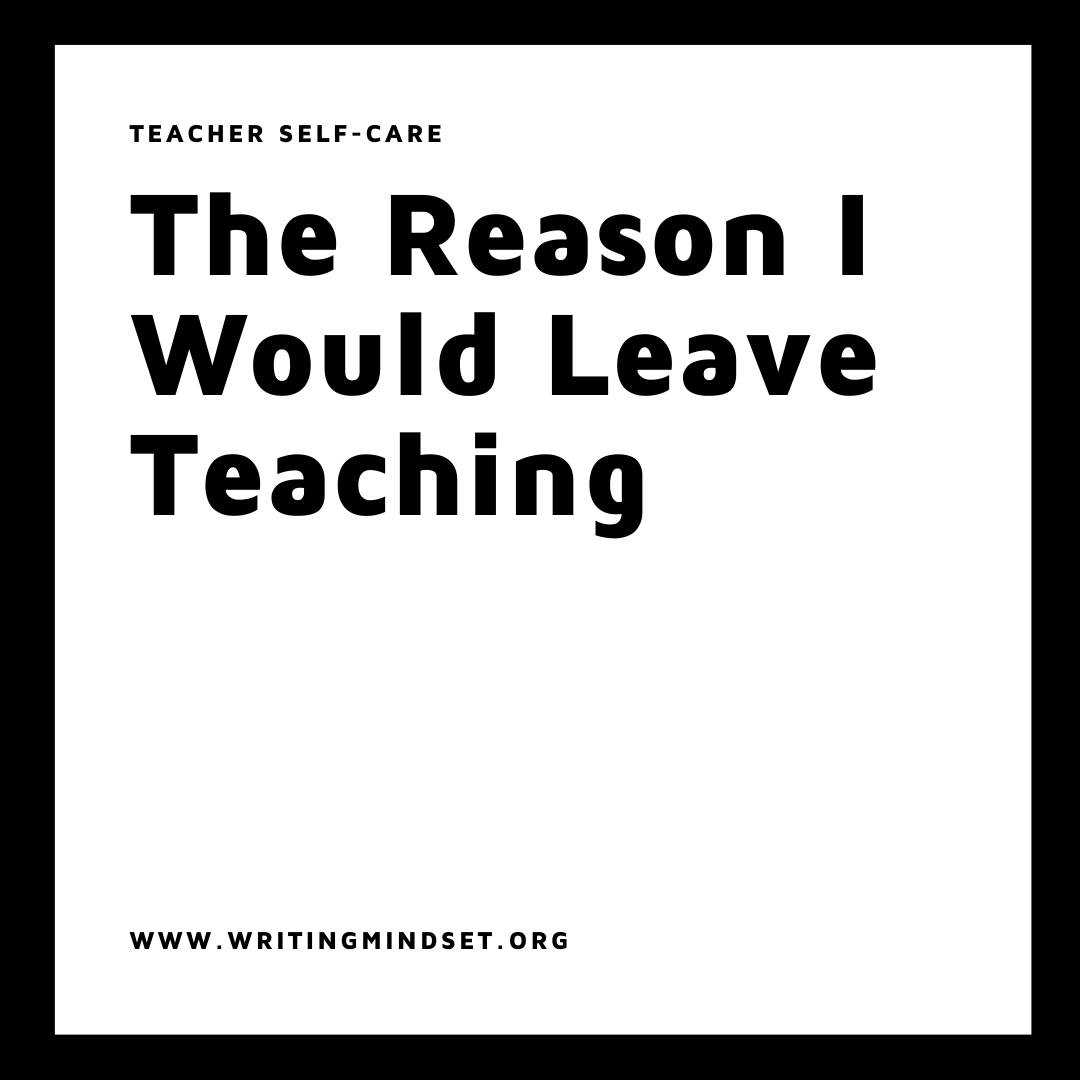The Reason I Would Leave Teaching
Should I Stay?
My favorite cup of coffee right now is Starbucks Pike Place roast with the International Delights Caramel One Touch Latte. Whatever your favorite drink to read to or think to....serve it up. This post is going to take some time and talk about one critical issue in the area of Secondary English Teaching. If you aren't a Secondary English Teacher, this issue still may apply to you, but the emphasis here is on a specific content area.
The Reason
The post is titled "The Reason I Would Leave Teaching" because the reason I am going to discuss is the only and main reason I would ever consider getting a different profession. I could easily go to nonprofit work or even sit behind a desk. I wonder sometimes what it would be like to pee whenever I wanted to or to be able to go on a lunch hour to a spot "around the corner." These are luxuries that teachers don't have. And many reasons that teachers leave do not involve my main reason for contemplating leaving. In fact, I am in love with classroom management. I love tough kids. I see many teachers leave the profession because they are not getting the support they need when it comes to classroom management or organization. I also see teachers leave due to pay, working conditions, lack of supplies, lack of support from administration, class sizes, etc. Eddie B Comedy offers some amazing jokes about teacher issues and the Michigan Education Association wrote a pretty great article titled "The Disappearing Educator." I often give this article to interns to make sure they know what they are getting into in terms of this profession.
My reason? Paper. I am not referring to the stacks of data that have to be kept on students, or testing, or even the positive behavior incentive charts that are often filled out. I don't even have an issue with my grade book or printing out my attendance sheets every week in order to track accurate data measures. I am not even talking about some of the ridiculous paperwork associated with my evaluation process. I am talking specifically about teacher-to-student written feedback or exchange. Because this feedback loop is so critical to the teaching of writing, it is also the one critical issue and potential demise for myself and my other fellow teachers of english. In the words of my fellow teacher:
If everything else is good. You better figure it out.
Let me introduce to you a friend.
My favorite cup of coffee right now is Starbucks Pike Place roast with the International Delights Caramel One Touch Latte. Whatever your favorite drink to read to or think to....serve it up. This post is going to take some time and talk about one critical issue in the area of Secondary English Teaching. If you aren't a Secondary English Teacher, this issue still may apply to you, but the emphasis here is on a specific content area.
The Reason
The post is titled "The Reason I Would Leave Teaching" because the reason I am going to discuss is the only and main reason I would ever consider getting a different profession. I could easily go to nonprofit work or even sit behind a desk. I wonder sometimes what it would be like to pee whenever I wanted to or to be able to go on a lunch hour to a spot "around the corner." These are luxuries that teachers don't have. And many reasons that teachers leave do not involve my main reason for contemplating leaving. In fact, I am in love with classroom management. I love tough kids. I see many teachers leave the profession because they are not getting the support they need when it comes to classroom management or organization. I also see teachers leave due to pay, working conditions, lack of supplies, lack of support from administration, class sizes, etc. Eddie B Comedy offers some amazing jokes about teacher issues and the Michigan Education Association wrote a pretty great article titled "The Disappearing Educator." I often give this article to interns to make sure they know what they are getting into in terms of this profession.
My reason? Paper. I am not referring to the stacks of data that have to be kept on students, or testing, or even the positive behavior incentive charts that are often filled out. I don't even have an issue with my grade book or printing out my attendance sheets every week in order to track accurate data measures. I am not even talking about some of the ridiculous paperwork associated with my evaluation process. I am talking specifically about teacher-to-student written feedback or exchange. Because this feedback loop is so critical to the teaching of writing, it is also the one critical issue and potential demise for myself and my other fellow teachers of english. In the words of my fellow teacher:
If everything else is good. You better figure it out.
Let me introduce to you a friend.
The Red Cart of Doom.
Okay, so a little dramatic. However, this baby will often come home with me every single weekend. Now, I have a schedule worked out when to attack the cart and sometimes I need a space this large to carry in materials for the next week. However, I want the red cart of doom out of my life. For good.
Explanation of the Reason Using Numbers
I have around 158 students each year. This is my district's contractual limit; however, it can vary. Many districts have less and those teachers still experience this issue. Many districts could have more (I shuttered a little). I had two preps last year: General English 6 and Advanced English 6. I have had 3 and 4 in the past, and 2 is by far the most manageable. Knowing this, I try to rotate when I am taking in assignments from both of my preps so I do not end up with 158 five-paragraph-essays at home to grade and turn-over. Let's break down the numbers.
1 paragraph takes 1 minute to grade.
5 paragraphs take 4-5 minutes to grade.
One academic essay set up in a standard format takes 5-6 minutes to grade.
75 Advanced English Argumentative Essays take 450 minutes to grade. This is 7.5 hours.
I get to school around 7:00 am each day and the kids leave at 2:30. This is also 7.5 hours.
Is anybody catching on to this issue? These papers have to come home in order to get feedback. Right?
If English Teachers figure out how to provide quality feedback in a faster amount of time, fewer of us will leave. Period.
My Attempts At Solving "The Reason"
First Attempt: Writing Portfolios/Binders
My first attempt is when I started to do binders in class. I like binders because they are a tangible way to track the writing process. It also allows me to grade items in class, and then have students file their binders away on the shelf. I help make tabs with students each year. Their writing portfolio is a great way to put the responsibility of paper back on the students. This way, my focus is then this: I am not taking anything home with me that does not require extensive feedback. I already know the mantra: "You don't have to grade everything, Stephanie" Yes, I know.
Second Attempt: Streamline Homework
I love Kelly Gallagher's Article of the Week, and I have seen the effects on my students' ability to read non-fiction texts. I assign articles of the week (and am also playing around with words of the week) to help students build these non-fiction skills. They also have a task associated with every article. The strategy is simple: Hand out homework on Monday, and it is due on Friday. Students may have other smaller assignments throughout the week or reading to do in a novel, but the main homework is the AOW. These AOWS are checked off on Friday and placed into binders. Thus, helping to eliminate paper problems.
Third Attempt: Class Participation
I have the student rosters that I use each week. I check off participation, I check off effort, I check off the commitment to trying to write on Friday Free Writes and I also check off quick writes/tickets out of the door. Apparently, students also want to be graded on participation. I love a good checkmark and a stamp. These efforts help, but they do not cut down on the time spent at home as much as they should. I was already checking these items off and putting them in the grade book. My bigger issue is with longer pieces of writing.
Fourth Attempt: Technology
I love google classroom. In fact, I am thinking of moving my student blog off of Wordpress and going strictly to google classroom next year. I particularly like having students type their papers in google classroom because I can give them feedback. They can resolve this feedback and learn from their immediate writing mistakes. This helps with deciphering feedback from me and also working with peers on writing. I also love google rubrics. I love using Google Forms as a way to make a rubric. Often for a final draft, I will use a Google Form as a rubric to check off if students made revisions and edits. This is helpful because I can leave voice comments on the rubric using an iPad, check off the boxes, and simply print their rubric with feedback at school. I love these strategies that involve technology; however, they are more for final drafts and not rough drafts.
Rough drafts are where the learning is.
Fifth Attempt: Collaborate with Others
I have also tried to figure out from many English Teachers I know and love how they handle the paper load. Some have said, "You just give less feedback." Some have accepted that this is part of the job and that grading papers in bed is something that we have to deal with as professionals. One teacher I work with uses a number system where she will assign a number to a recurrent piece of feedback and then give a key to students. This helps her cut down on the amount of clock time spent on papers. There are a lot of potential ideas, but not very many solutions.
I know this process will vary from teacher to teacher. However, I am more curious as to whether we all may be doing it all wrong. I am open to being wrong. The articles and research I have looked at all dictate that more time spent in class should be dedicated to giving students feedback in real-time. This is a puzzle to me. Let's say I set up a really fun station activity for the week, and I, the teacher, was a station that gave feedback in time. I would only get through 10-12 students in that hour. This is 3 days of rotations...maybe. While it might be worth shoving my pacing guide off to the side, would everyone agree with my ideas?
I have lots of questions and few answers at this point. However, I think this "paper debate" has sparked some inspiration at Writing Mindset. If paper might stop me from being a teacher, it would definitely stop others. I want to be a teacher AND not take papers home AND give quality feedback that matters. They were will be more posts to come as a hunt for solutions.




